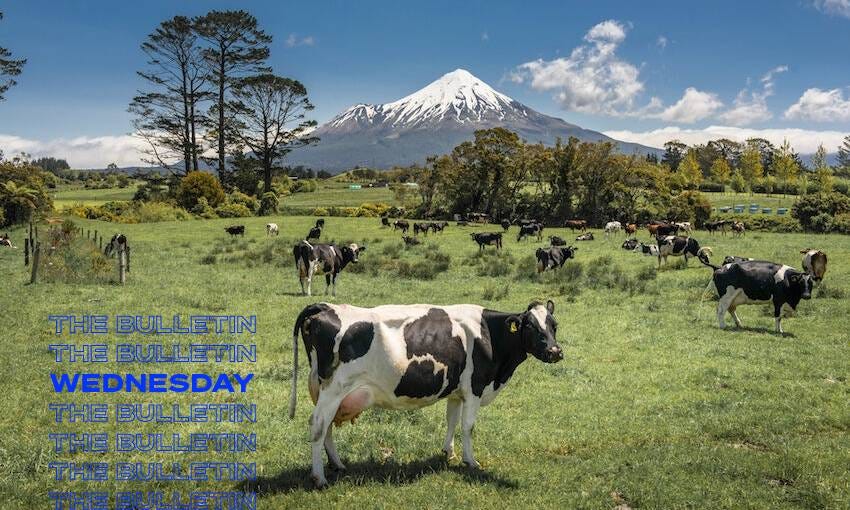The future of the GMO ban
New Zealand’s genetic engineering laws face a tough challenge from new technology
Mōrena and welcome to The Bulletin for Wednesday, April 13, by Justin Giovannetti. Presented in partnership with Z Energy.
In today’s edition: Australian tourists arrive; police promise powerful response to crime; NZTA to control bitumen supply; but first, a look at genetic engineering in Aotearoa.
Dairy cows on a farm in the Taranaki region. (Getty Images)
The ban on genetic engineering is facing an impossible problem.
There’s a hole in the wall keeping genetically modified organisms out of New Zealand and it’s shaped like an impossible burger. As Chris Schulz wrote for The Spinoff, the lab-designed meat is the biggest name in the plant-based craze. However, the impossible burger would be impossible without genetic engineering. The core of the burger is a heme molecule that gives the meat its taste and bleeding character. The Listener (paywalled) also looked at the growth of consumer interest in plant-based alternatives. Aotearoa’s food safety regulator had to approve the impossible burger’s sale here, giving it an exemption to the country’s ban on GMOs. While it’s not the first genetically engineered technology allowed into the country, it’s a sign of the growing pressure on Aotearoa’s laws.
There’s a growing call for a review of the country’s regulations.
There hasn’t been a review of New Zealand’s laws covering GMOs in over two decades. RNZ reports that the Productivity Commission now warns that current regulations don’t reflect 20 years of breakneck technological advances. The commission has recommended that regulations should accomodate new technology and not “stifle” innovation. The government responded that Aotearoa’s brand is GMO-free and it wants to maintain a “proceed with caution” approach to genetic engineering. There’s also little public interest in changing regulations. However, the Productivity Commission is not alone. The Climate Change Commission also recommended last year that the government consider allowing genetic engineering that could cut emissions from agriculture.
The resistance to change can be fierce. So can the calls for it.
GMOs can be a passionate topic and there’s no easy way to define the arguments on both sides. Prem Maan, the executive chairman of Lewis Road Creamery and Southern Pastures, wrote a defence of current laws last year. He warned of possible massive damage to the environment from uncontrolled spread of GMOs and said the current ban keeps New Zealand’s food exports premium, “wholesome” products. Similar arguments are made every few years, when a new report comes out. Mia Sutherland, a former school strike for climate organiser, wrote for Stuff that GMOs are the climate option. With the country facing a serious challenge to rapidly slash climate emissions this decade, some genetically engineered grasses could help cut agricultural emissions by nearly half. Newsroom also looks at the advances in science and argues this goes far beyond GMOs, with New Zealand also strictly limiting gene editing.
The future holds a lot of radical biology.
It’s possible that you’ll be reading a newsletter in another 20 years that also covers the country’s largely GMO-free status. But it’s unlikely. While there’s been tremendous technological change in the 20 years since the country’s last GMO review, the next two decades promise to be even more transformative. “Biology is the most important technology of this century,” Wired argues in a recent review of what’s to come. In ways that already seem unthinkable, technology is being used right now to edit and rewrite life. The future, for better or worse, will be increasingly synthetic.
A note from deputy editor Alice Neville:
While most vaccine mandates have ended and the occupiers have left parliament grounds, the story is far from over. As Covid continues to spread, so does mis- and disinformation, which makes fact-based and level-headed journalism more important than ever. We’re keeping a close watch on this ongoing story, from the inadequate regulation of disturbing online content, to those trying to turn the parliament occupation fury into a political force, to the next target of the protest ringleaders.
But we can’t do this – or the award-winning collaborations between Toby Morris and Siouxsie Wiles, painstakingly, sensitively reported investigations or up-to-the-minute live updates – without your support. As we continue to struggle against commercial pressures, contributions from our members are more critical than ever.
If you want to support what we do, please consider becoming a member today. Donate now.
NZ airports to welcome Australians from today.
Thousands of travellers from across the Tasman are expected to land in Auckland, Christchurch and Wellington today. Stuff looks at the work underway at the border to prepare airports for the arrivals. The prime minister is expected at Wellington’s airport to greet some tourists as they step off. One thing many of those travellers won’t have is insurance. Stuff asks: should we mandate travel insurance for arrivals, especially in Covid times? The reopening of the border could also fuel a growing exodus from Aotearoa. The NZ Herald writes that up to 50,000 residents could leave this year, according to a warning from officials.
At 1pm today the government will announce whether the country, or some part of it, will move to orange. Derek Cheng explains in the NZ Herald (paywalled) what the government will consider in the move.
Police to respond to surging central Auckland crime.
Data from police shows that crime in central Auckland is about 30% above pre-pandemic levels. Facing accusations that they are letting criminals run rampant, police told RNZ they will return with a “powerful” presence. In the year to March, over 1,971 assaults in the central city were recorded. Police in central Auckland blamed the crime increase on the replacement of missing international students and tourists with vulnerable people. Nationwide in 2021, arrest rates are down 1% and the average response time for an officer to get to a crime scene is up to 1 hour and 49 minutes.
NZTA to take control of the country’s bitumen supply.
Suppliers have been overcharging Waka Kotahi for bitumen, essential in road building, the NZTA argues. RNZ reports that with the closure of the Marsden Point refinery, the agency has a plan to start importing its own bitumen. Z, which controls about 70% of the bitumen market right now, argues that it hasn’t overcharged the transport agency. The story shows what a dog’s breakfast the Official Information Act can be. The agency told RNZ that no such bitumen plan exists, while also giving it documents that detailed the plan. A complaint has been made to the ombudsman.
News publishers close in on negotiations with social media giants.
The Commerce Commission has given New Zealand’s news publishers provisional authorisation to begin collective negotiations with Facebook and Google over payment for their content. Stuff reports that the News Publishers’ Association (which includes The Spinoff) have warned that the power of the social media giants pose a significant risk to local media. Australia has a bargaining code to help its news media negotiate with the global companies, nothing similar exists in Aotearoa.
How the ministry of health requisitioned Rats.
As of late January, only 2% of the health ministry’s order of rapid antigen tests had been confirmed for delivery. Government officials then asked, demanded and ordered that suppliers prioritise health’s orders over those of private business. Thomas Coughlan reports for the NZ Herald from internal health emails about how the requisitioning happened. The emails don’t back the government’s earlier argument that no such orders were made.
Got some feedback about The Bulletin, or anything in the news? Get in touch with me at thebulletin@thespinoff.co.nz
Chris Schulz investigates the pros and cons of getting groceries delivered from Australia. Toby Manhire reports on a NZ retailer who keeps hawking “miracle” bleach to treat Covid. Charlotte Muru-Lanning writes about the ex-Shortland Street star landlord who gave his tenant a bad review over vaccine passes. Toby Manhire discovers fresh splits in the occupation movement, now at Marsden Point. Hal Crawford ponders why online subscriptions to The Economist cost twice as much in NZ as the US.
America’s Cup champions launch sailing team for women.
Peter Burling and Blair Tuke want to get women foiling on the water, with a new team they hope will propel female sailors into professional events. RNZ reports that the team, Live Ocean Racing, will promote an environmental foundation and new sailing ventures. A crew of three female sailors will compete on a 26-foot foiling catamaran, inspired by the boats used at the America’s Cup.












If Hal Crawford is rethinking his subscription to The Economist, it's available free (Asia edition) on Libby if you have an Auckland Libraries membership. Other libraries might be worth checking out.